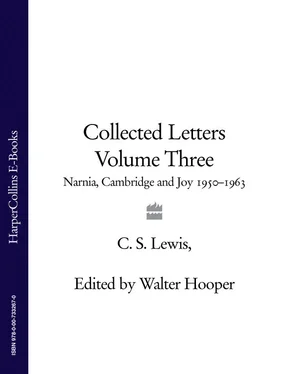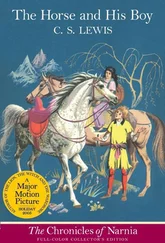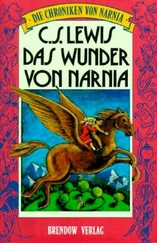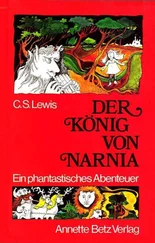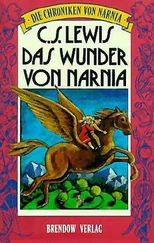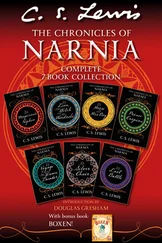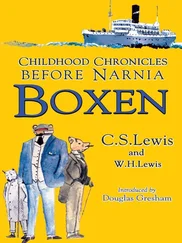C. S. Lewis
*
Magdalen College,
Oxford,
England
Sept 13th 1951
Dearest Father—
I was moved with unaccustomed joy by your letter and all the more because I had heard you were ill; sometimes I feared lest you had perhaps died.
But never in the least did I cease from my prayers for you; for not even the River of Death ought to abolish the sweet intercourse of love and meditations.
Now I rejoice because I believe (although you keep silent about your health—do not condemn the body: Brother Ass , as St Francis said!) 137 I believe you are well or at least better.
I am sending you my tale recently translated into Italian in which, frankly, I have rather played than worked. 138 I have given my imagination free rein yet not, I hope, without regard for edification—for building up both my neighbour and myself. I do not know whether you will like this kind of trifle. But if you do not, perhaps some boy or girl will like it from among your ‘good children’.
For myself, after a long succession of minor illnesses (I do not know their Italian names) I am now better.
I salute the fiftieth anniversary of your priesthood with congratulations, prayers and blessings. Farewell. May we always pray for one another both in this world and in the world to come.
C. S. Lewis
TO BERNARD ACWORTH (W): 139
Magdalen College,
Oxford
13th Sept. 1951
Dear Acworth–
I have read nearly the whole of Evolution 140 and am glad you sent it. I must confess it has shaken me: not in my belief in evolution, which was of the vaguest and most intermittent kind, but in my belief that the question was wholly unimportant. I wish I was younger. What inclines me now to think that you may be right in regarding it as the central and radical lie in the whole web of falsehood that now governs our lives, is not so much your arguments against it as the fanatical and twisted attitudes of its defenders. The section on Anthropology was especially good.
I am just back from Ireland where I have had the great pleasure of meeting an old friend of yours—Conway Ross. He told me you were one of the only two men who ever ‘talked him down’ and he hoped I wd. be the third. This hope was disappointed: ‘faith he gave me little chance to fulfil it. But he’s a grand chap and a man of my totem.’
The point that the whole economy of nature demands simultaneity of at least a v. great many species is a v. strong one. Thanks: and blessings.
Yours
C. S. Lewis
TO VERA MATHEWS (W):
Magdalen College,
Oxford.
Sept 15th. 1951
Dear Miss Mathews
I will convey your kind message to my brother. St. Ives (it was my friends’ choice, not mine) isn’t the tucked-away and time-forgotten nook you picture, but a good deal spoiled by holiday-makers.
Since then, I have been really in quiet and almost unearthly spots in my native Ireland. I stayed for a fortnight in a bungalow which none of the peasants will approach at night because the desolate coast on which it stands is haunted by ‘the Good People’. There is also a ghost but (and this is interesting) they don’t seem to mind him: the faerie are a more serious danger.
I am told that fewer Americans than usual visited England this year so the Festival, from that point of view, was a failure: it was, in any case, a silly business. With all sympathy, blessings, and, as always, thanks.
Yours
C. S. Lewis
TO WILLIAM L. KINTER (BOD):
Magdalen College,
Oxford
24/9/51
Dear Mr Kinter
I have been in Ireland, revisiting the haunts and some of the friends of my boyhood, and that is why your letter of Aug 22nd. has been so long unanswered. A ham is not a ‘small thing’, but a glorious creature. If the shortages within our English ‘Tin Curtain’ did not affect others so much more grievously than me, I could almost give thanks for a state of affairs which restores to men in their fifties a healthy schoolboyish interest in eating. It gives us a chance (which I fear I often forget to take) of making grace before meals a reality.
I rather envy your visit to Boethius’ tomb: 141 but perhaps his shade wd. be more pleased if I re-read the Consolatio. 142
My Numznor was a mispelling: it ought to be Numenor. 143 The private mythology to which it belongs grew out of the private language which Tolkien had invented: a real language with roots and sound-laws such as only a great philologist cd. invent. He says he found that it was impossible to invent a language without at the same time inventing a mythology: he adds that Muller was wrong in calling mythology a ‘disease of language’ 144 and that it wd. be truer to say that language was a disease of mythology. I don’t quite understand that.
The private mythology ‘clicked’ with this world at the moment when the participle atlan (fallen or shattered) which had been produced by sound laws with no anticipation of what it wd. lead to, when applied to the vanished land of Numenor, turned out to be so obviously connected with our vanished land of Atlantis . A letter to him direct (J. R. R. Tolkien, Merton College, Oxford) wd., I am sure, give pleasure and elicit a full and most interesting reply.
I am so glad you liked the Lion: there will be another children’s story in November. With v. many thanks & good wishes.
Yours sincerely
C. S. Lewis
TO ROGER LANCELYN GREEN (BOD):
Magdalen College
Oxford
27/9/51
Excellent. Will Tu. Oct. 30th do? RSVP.
J.
TO BERNARD ACWORTH (W):
Magdalen College
Oxford
4/10/51
Dear Acworth–
No, I’m afraid. I shd. lose much and you wd. gain almost nothing by my writing you a preface. No one who is in doubt about your views on Darwin wd. be impressed by testimony from me, who am known to be no scientist. Many who have been or are being moved towards Christianity by my books wd. be deterred by finding that I was connected with anti-Darwinism.
I hope (but who knows himself!) that I wd. not allow myself to be influenced by this consideration if it were only my personal success as an author that was endangered. But the cause I stand for wd. be endangered too. When a man has become a popular Apologist he must watch his step. Everyone is on the look out for things that might discredit him. Sorry.
Yours
C. S. Lewis
Lewis had been working on Volume III of the Oxford History of English Literature , English Literature in the Sixteenth Century, since 1936. Beginning with the Michaelmas Term of 1951, Magdalen College gave him a year off to complete the hook. He did no teaching during that time .
Prince Caspian: The Return to Narnia was published by Geoffrey Bles of London on 15 October .
TO MRS JESSUP(W):
Magdalen College,
Oxford.
15/10/51
Dear Mrs. Jessup–
I agree with everything you say (except that I shd. publish anything on the subject: a bachelor is not the man to do it—there is such an obvious answer to anything he says!).
Our regeneration is a slow process. As Charles Williams says there are three stages: (1.) The Old Self on the Old Way. (2.) The Old Self on the new Way. (3.) The New Self on the New Way.
After conversion the Old Self can of course be just as arrogant, importunate, and imperialistic about the Faith as it previously was about any other interest. I had almost said ‘Any other Fad’–for just as the loveliest complexion turns green in a green light, so the Faith itself may have at first all the characteristics of a Fad and we may be as ill to live with as if we had taken up Nudism or Psychoanalysis or Pure Wool Clothing. You and I, clearly, both know all about that: one makes blunders.
Читать дальше
